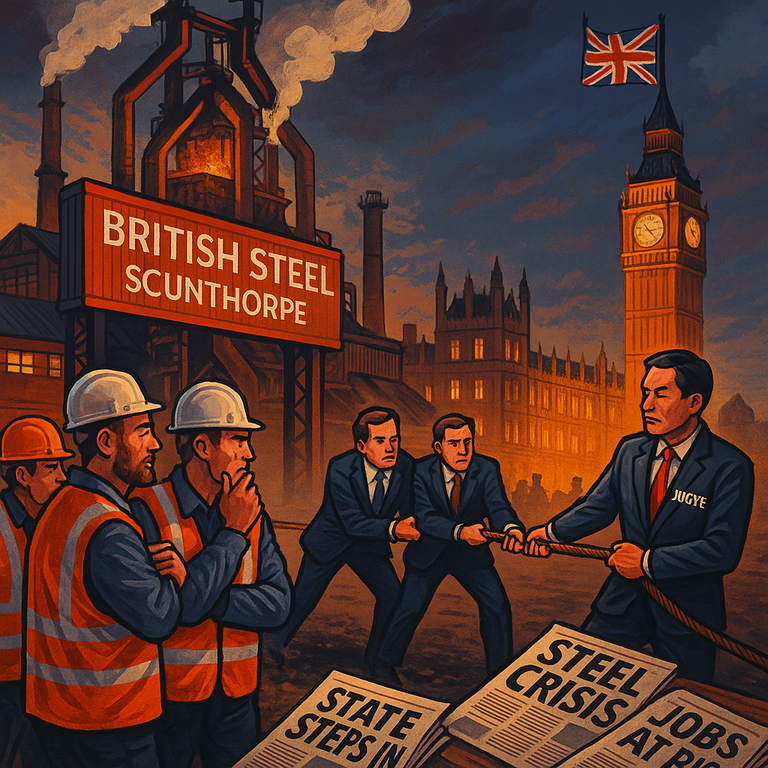British Steel on the Brink: What's Really at Stake?
Parliament was reconvened for a weekend session to introduce emergency legislation to keep British Steel open, the first Parliament has sat at the weekend since the Falklands War of 1982.
With this legislation the British Government took day-to-day control of British Steel a couple of weeks ago, following breakdown of talks with its Chinese owner, Jingye, on the future of the Scunthorpe steelworks. As the anxiety mounted that Britain's only last two blast furnaces were set to shut, emergency legislation was rushed through so that the works could stay open.
The factory, they claimed, is reportedly hemorrhaging £700,000 daily in addition to £1.2bn Chinese investment. Jingye was accused by ministers of not-acting (so to speak) in bad faith and standing idly by while reserves of raw material run down, sparking alarm at the UK's loss of its remaining capacity to produce virgin steel, an industrial essential.
The government argued the take over was essential to secure raw materials to prevent chilling the blast furnaces, something that would make it too expensive to restart them. Business Secretary Jonathan Reynolds called for greater defence of strategic sectors from foreign takeover, particularly with increasing geopolitical tensions with Beijing, who warned against politicising the crisis.
The closure of Scunthorpe furnaces would have also resulted in the loss of 2,700 jobs and deprived Britain of a supplier responsible for 95% of UK rail tracks.

State Takeover or Black Hole?
Editorials tended to support the government's intervention. The Sunday Times argued that keeping top-quality steel production in its hands is a matter of national security, especially during times of uncertainty. The Independent and others have said that the government never should have allowed Jingye to take over in 2020, and that Beijing is "not a benign player in world affairs." With ministers temporarily taking control of British Steel, everyone expects Labour will eventually nationalise the company, something The Guardian said it was needed because the truth of the matter is that the global steel industry is ruled by state power, subsidisation, and protectionism.
But The Economist questioned whether, in fact, the UK needed to be able to make virgin steel, given that Scunthorpe already uses imported iron ore and coal. If the country remains import-dependent, what does nationalisation do?
Eye-Watering Costs and Looming Challenges
Other commentators have highlighted the cost and complexity of the rescue. As Alistair Osborne wrote in The Times, the government has arguably "rescued a company as taken on a cash black hole," and taxpayers will more than likely be footing the bill. That is only added to by the UK's steel industry facing particularly high energy prices—around twice Germany and France, and four times the US—affecting British Steel's crisis particularly acutely. US tariffs, 25%, and steep energy bills threaten to bankrupt the company unless things drastically change.
The Future: Can Britain Modernise?
The plight of British Steel is not unique. Tata Steel at Port Talbot, South Wales, closed its blast furnaces this autumn due to converting to electric arc furnaces (EAFs), which are more efficient but produce lower-grade steel from waste metal—unusable for any industrial use. While converting Scunthorpe to EAFs also, the government is waiting. Labour has pledged £2.5bn to reshape the industry, but there are doubts: can the UK bring in the investment and innovation it requires to make steel-making viable, or will it always be fighting an uphill struggle against cheaper subsidised foreign competition?
As the government weighs the advantages and the expense of intervention, one thing is clear: the future of British Steel is more than an industrial story, but a testament to how Britain envisions its own future in a more protectionist and uncertain world.
Posted Using INLEO
Considering the US-China trade wars, embracing such foundations is important.
What a challenge. Having the ability to produce steel domestically is definitely a blessing not considered as seriously as it is these days. You really should be able to trade with other nations better set up to produce. With dickface blackout drunk at the wheel of global trade, it might just be a huge investment to keep it going.
Our steel and automotive industries in Canada are being tested severely now that the moron turns USA into an economic bully not expecting any negative effects. Imagine the inefficiency that will come if e Rey nation has to make instead of buy.
I think we've always wanted to produce some of it domestically, of course it's a bit of an odd one because we don't produce the raw materials domestically, we import those! Trump doesn't help!
https://www.reddit.com/r/Economics/comments/1k9c146/british_steel_on_the_brink_whats_really_at_stake/
The rewards earned on this comment will go directly to the people( @loading ) sharing the post on Reddit as long as they are registered with @poshtoken. Sign up at https://hiveposh.com. Otherwise, rewards go to the author of the blog post.
Congratulations @revisesociology! You have completed the following achievement on the Hive blockchain And have been rewarded with New badge(s)
You can view your badges on your board and compare yourself to others in the Ranking
If you no longer want to receive notifications, reply to this comment with the word
STOPCheck out our last posts: